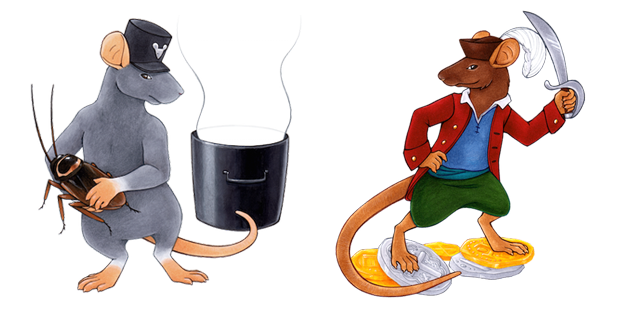IF Only: The Works Of Ryan Veeder
An overview of Ryan Veeder's interactive fiction
There are a handful of IF authors whose work is consistent and satisfying, who repeatedly and frequently release things their fans rush to play. Andrew Schultz turns out a wordplay puzzle game or two a year. Caelyn Sandel wrote a serialized Twine story called Bloom, with a steady supply of new installments. And then there's Ryan Veeder, a master of short parser games who produces several a year, often outside of any competition setting.
Veeder's work typically feels light and playful, meringue-like; but that easy accessibility is the result of considerable skill in both coding and writing. Many of Veeder's games are quietly doing something a bit difficult under the surface, but doing it so well and so casually that you never realize how much work must have been involved. This is an author who wrote an accessible, non-boring game with the title Reference and Representation: An Approach to First-Order Semantics. The game actually is about that subject, too. It's just that the gameplay makes the point playable.
In fact, this is kind of key to Veeder's whole persona and production. Regardless of his subject matter, it never feels like he's showing off or trying to prove something. Sometimes he writes games about linguistic concepts or featuring quotes from Milton, and sometimes he writes games (possibly even the same games) about stuffed felt dinosaurs. But it always feels as though he's meeting the player on a level, looking to share something that he enjoys. So many parser games are framed as a battle of wits or of wills between the author and the player — indeed the early text adventures tended to make fun of the player for any errors or failures — whereas a Veeder game feels like a collaboration. The narrative voice is casual. Veeder often breaks the fourth wall to address the player directly, but in a chummy way, as though he were sitting next to you on the sofa watching you play and just offering a couple of tips to smooth out your experience. He really wants you to have a good time.
Pretty much all of his games are playable within two hours, and most of them will be more around half an hour: perfect to fill out a lunch hour and leave you in a good mood at the end.
Taco Fiction is the Veeder game that won IF Comp 2011. The protagonist is a less-than-eager robber who soon finds himself embroiled in surprising events in the community he meant to rob. When I first played the game, I singled out the following quote from it, which I still like:
A tiny, lonely trio: This one is the key to your car; this one is the key to your apartment, and this one used to be the key to someone else’s apartment, before that someone changed the locks.
There's a knowing, resigned quality to the narration. The protagonist is doing something very stupid, and yet you can sympathize with both his reasons and his reactions.
Captain Verdeterre's Plunder is another obvious favorite, and one that offers a lot of replay options. The premise: your ship is sinking. Your captain, a rat, wants you to strip as many treasures as you can before the whole thing goes under the waves. Different items take different amounts of time to retrieve, but the lower parts of the ship rapidly become inaccessible as the water rises. How do you optimize your treasure-grabbing tour and avoid drowning while you're at it?
As story goes, it's a pretty light experience, but some people have put a lot of time into optimizing their treasure run; and, unsurprisingly from Veeder, Captain Verdeterre's commentary is entertaining if not always particularly good advice. As a bonus, if you enjoy Veeder's take on rat NPCs, you can also check out his first published game, You've Got a Stew Going!
An Evening at the Ransom Woodingdean Museum House is an interactive ghost story that does a pretty effective job of ramping up the nerves. Winter Storm Draco is a piece about surviving severe winter weather that treats that weather as a character in its own right. Dial C for Cupcakes is a goofy game about finding baked goods at a Halloween party, but nonetheless folds in a tricky flashback sequence and some technical cleverness that lets the player rewind puzzles to the last point at which they were winnable.
And if you play all the Ryan Veeder games and still want more? First of all, don't worry: he has a track record of writing several games a year, so that the odds are there will be others along soon. But you might also want to check out the entrants to the First Quadrennial Ryan Veeder Exhibition for Good Interactive Fiction. This is a competition that Veeder ran with the sole judging criterion being how much he, Ryan Veeder, enjoyed the results. A lot of interesting games were submitted, and the top placers do an uncanny job of mimicking Veeder's own style, game features, and sense of humor.
Buster Hudson's winning Exhibition entry Foo Foo is a mystery story centering on nursery rhyme characters: silly, light-hearted, and charming, it still does hang together pretty well as a game. It's most fun if you've played enough of Veeder's games that you recognize all the references Hudson has packed into every scene — but it's still entertaining even without that knowledge. From the same Exhibition, I'd also recommend Robin Johnson's entry Draculaland, a friendly and playable riff on vampire tropes.
I subscribe to Veeder's Patreon. It's a good deal. Not only do you hear about his new works as they come out (sometimes before they reach the general public), but you can also get access to his source code releases, with authorial commentary. But even if you don't want to sign up for anything, his entire back catalog is free.
[Disclosures: Emily has appeared on Ryan Veeder's podcast Clash of the Type-ins, where she talked about both Ryan's work and her own. More generally, Emily Short is not a journalist by trade and works professionally with various interactive fiction publishers. You can find out more about her commercial affiliations at her website.]











